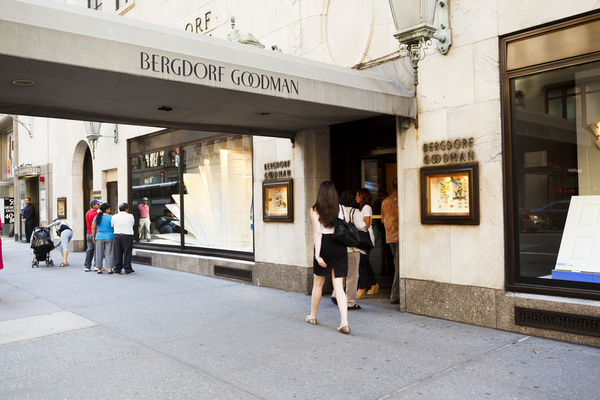Ira Neimark, who expanded, modernized and resurrected high fashion at one of New York’s premier retailing emporiums as president of Bergdorf Goodman from 1975 to 1992, has died. He was 97. His death was reported on Twitter by Maryann Karinch, his literary agent. Women’s Wear Daily said he died on April 18 at his home in Harrison, N.Y.
During his career in retailing, Neimark ascended the ranks of such regional operators as B. Altman in New York and G. Fox in Connecticut, but with a clear vision and strong team behind him, he really made his mark at Bergdorf’s, successfully transforming the store into one of the world’s most elegant luxury emporiums. Neimark was a 35-year department-store veteran, starting as a teenager at Bonwit Teller, when he became chief executive officer of Bergdorf Goodman, the Manhattan luxury-goods store based since 1928 on Fifth Avenue between 57th and 58th streets.
A year before his arrival, Bergdorf Goodman had opened its first branch store, in White Plains, New York. The site struggled until 1980, when it was turned into a Neiman-Marcus Co. store by Carter Hawley Hale Stores Inc., the Los Angeles-based parent of the two high-end retailers. Neimark opposed branching out in favor of focusing time, money and innovation on the store’s Manhattan home. He led renovations that increased its selling space by 50 percent, installed its first escalator and added a home-furnishings department on an expanded seventh floor.
He resurrected the store’s ties to the haute couture houses of Europe, holding lavish fashion shows that helped draw attention to up-and-coming designers as well as to his store. Bergdorf Goodman Men, advertised as “the ultimate store for gentlemen,” opened in 1990 directly across Fifth Avenue.
Transformed Retailer
In “The Rise of Fashion and Lessons Learned at Bergdorf Goodman,” his 2011 book, Neimark said he succeeded in transforming the retailer “from an old, dull, expensive and intimidating store to a young, expensive, exciting and intimidating store.” Annual sales, about $38 million when he took over, had reached $250 million when he retired in 1992, he said.
Neimark was born in 1921 and raised in Brooklyn. He was the middle son of three born to Eugene Neimark and the former Lillian Brody, according to the 1930 U.S. Census. His father — a lawyer in Neimark’s account; an insurance broker, according to the census — died in 1933. Neimark grew up downstairs from his maternal grandparents and his mother’s six sisters, an experience that he said taught him “how women thought about themselves and how they wanted to look.”
Bonwit Teller
In 1938, an employment agency directed him to Bonwit Teller, a fashion-oriented Fifth Avenue department store catering to wealthy customers. It had an opening for a pageboy, to check coats and serve drinks, at its 721 Club, a special Christmas mini-store where affluent men purchased gifts for the women in their lives.
Dressed like a bellhop in a red jacket, black hat and white gloves, he greeted guests at a Christmas party where Mary Martin sang “My Heart Belongs to Daddy” to “some of the most successful businessmen in New York City,” he wrote in “Crossing Fifth Avenue to Bergdorf Goodman,” his 2006 memoir. He stayed after the holiday, working as a door boy, taking night classes at Brooklyn’s Erasmus Hall High School. Following one year in the office of store president William M. Holmes, he was assigned to the handbag department. At 20, he enlisted in the U.S. Army Air Corps and served until the end of World War II.
Early Career
He returned to Bonwit Teller in time for its 1948 purchase by Walter Hoving’s self-named company. Neimark, who helped open new branches in Boston and Chicago, concluded that a rapid expansion strategy implemented by a series of new owners helped doom the business. It operated under Chapter 11 bankruptcy protection before closing most locations, including the Manhattan flagship, in 1990.
In 1951, Neimark left New York for jobs with Gladdings department store in Providence, Rhode Island, and G. Fox & Co. in Hartford, Connecticut. He returned in 1969 as vice president and general merchandising manager of B. Altman & Co. Taking the helm at Bergdorf Goodman in 1975, Neimark moved to re-establish it as New York’s leading stage for global fashion. He made exclusive deals with Yves Saint Laurent, Christian Dior and Givenchy and reconfigured the store’s second floor for what he called “European Collections.” The New York Times in 1978 called him “the only American store president currently buying couture clothes.”
Sidewalk Peddlers
In 1986, Neimark joined Donald Trump, the future U.S. president, and executives of other Fifth Avenue businesses in criticizing New York Mayor Ed Koch for failing to slow the proliferation of illegal sidewalk peddlers. At a press conference, Neimark said New York was “looking like Istanbul on a Sunday,” a comment he later apologized for following complaints from Istanbul’s mayor and some Turkish customers. In 1987, General Cinema Corp. took control of Carter Hawley Hale in a restructuring that assigned Bergdorf to a new Dallas-based unit, Neiman Marcus Group Inc. Neimark took on the additional role of vice president of merchandise development for the group.
Bergdorf has been owned since 2013 by Los Angeles private-equity firm Ares Management LLC and the Canada Pension Plan Investment Board, which bought Neiman Marcus Group from Fort Worth-based TPG Capital and New York-based Warburg Pincus LLC for $6 billion. Neimark and his wife, Jacqueline, had two daughters: Janie, who died in 2016, and Robin. He is also survived by five grandchildren and one great-grandson, according to Women’s Wear Daily.
—
Photo Credit: DW labs Incorporated / Shutterstock.com
